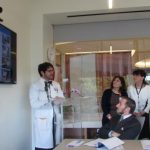
By Annie Keller
Published April 3, 2020
Inevitably, advances in medicine will lead to creating new positions as well as making older ones obsolete. For example, electronic health records have lead to new positions for security personnel that monitor the systems, but the actual physical act of filing is becoming unnecessary.
Medical innovation districts are creating jobs in medicine. These districts combine a large number of medical resources in the same area, often combining schools, labs, and hospitals in one place. A medical innovation district in Austin, Texas is estimated to bring in over 2,000 new jobs, a new addition to a hospital in Hartford, Connecticut with the latest in telehealth could employ 700, and a research center in Cincinnati, Ohio could bring in 20,000 new positions.
Innovation in medicine isn’t just about the new technology and jobs – it’s just as much about the people who work with it Digital technology and health sensors are both helping to transform medicine and improve care, so we need people who know how to make the data meaningful and useful. Technology that serves the patient and streamlines their experience can also be used to streamline the work of the doctor who sees them.
Several healthcare jobs are in high demand due to innovation. Medical technologists that work with MRI machines have experienced a 10% increase in positions, and medical engineers that work on prosthetics have experienced a similar increase. Ultrasound specialists as a field have grown over 23%.
How can someone tell if their job is going to be impacted by the latest healthcare innovations? And how will job changes affect the healthcare market? It can be difficult to tell, but one .thing is clear – the newest innovations may create jobs as fast as they make old jobs disappear.

 Previous Post
Previous Post Next Post
Next Post
Thanks for sharing about the IMPACT OF INNOVATION ON HEALTHCARE JOBS